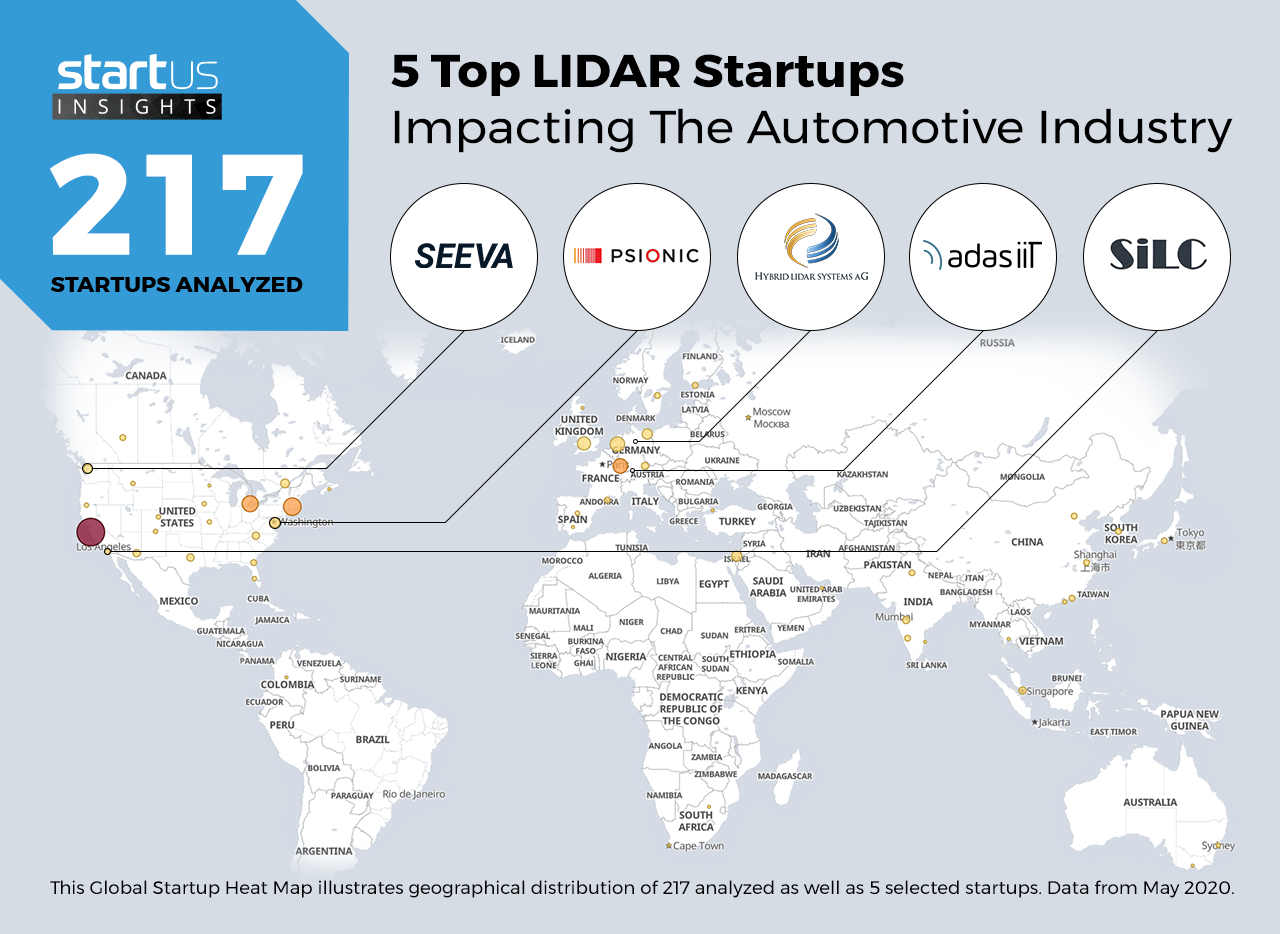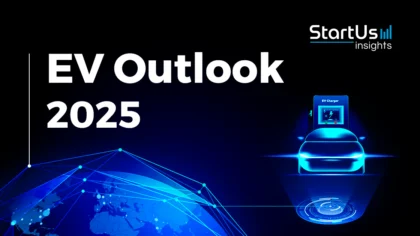Accelerate Productivity in 2025
Reignite Growth Despite the Global Slowdown
Our Innovation Analysts recently looked into emerging technologies and up-and-coming startups working on solutions for the automotive sector. As there is a large number of startups working on a wide variety of solutions, we want to share our insights with you. This time, we are taking a look at 5 promising Light Detection and Ranging (LIDAR) startups.
Heat Map: 5 Top LIDAR Startups
Using our StartUs Insights Platform, covering 1.116.000+ startups & emerging companies, we looked at innovation in the field of LIDAR. For this research, we identified 217 relevant solutions and picked 5 to showcase below. These companies were chosen based on a data-driven startup scouting approach, taking into account factors such as location, founding year, and technology among others. Depending on your specific criteria, the top picks might look entirely different.
The Global Startup Heat Map below highlights 5 startups & emerging companies developing LIDAR solutions. Moreover, the Heat Map reveals regions that observe a high startup activity and illustrates the geographic distribution of all 217 companies we analyzed for this specific topic.
Hybrid LIDAR Systems – Hybrid 3D LIDAR
Of many novels and emerging technologies in automotive, LIDAR offers comprehensive solutions for building safer autonomous vehicles (AVs). By fitting a few LIDAR sensors around the vehicle, high-quality images get captured and analyzed by artificial intelligence (AI). This continuous information analysis allows vehicles to make decisions quickly and with greater accuracy.
German startup Hybrid LIDAR Systems develops 3D LIDAR sensors with a patented hybrid time of flight (ToF) and photovoltaic (PV) technology. Aiming to replace existing large and bulky LIDAR sensors, Lissa, the company’s product, offers a higher range, accuracy, and employs solid-state technology. Hybrid LIDAR Systems also uses a scalable scanning matrix to save energy and increase the scanning speed.
SiLC Technologies – LIDAR Vision Chips
Another popular technology in LIDAR systems is the use of frequency-modulated continuous-wave (FMCW). This wider range enables analysts to use LIDAR to unlock remote sensing applications across industries. Commonly used for environmental sensing in wind measurements and PV measurements, startups and emerging companies develop novel solutions for autonomous vehicles using the FMCW LIDAR.
SiLC Technologies is a US-based startup that builds smart vision chips for 4D+ LIDAR. The company uses mature semiconductor fabrication processes to create their small smart vision chips. Additionally, with the help of silicon photonics integration technology, the chips enable high-volume manufacturing for complex devices across industries. As a result, chips integrated into autonomous vehicles connect to a Central Vision Processing unit that offers scalable LIDAR technology using lens optics and sensor resolution.
Psionic – Doppler LIDAR
One of the main benefits of the Doppler LIDAR instruments is its ability to simultaneously measure the range and velocity of things in the sensor’s environment. Developed originally for autonomous space vehicles, this LIDAR sensor provides longer range and durability for autonomous vehicles. Besides knowing how fast and in which direction an object moves, Doppler LIDAR allows cars to identify and navigate through pedestrians and other motorists on the road.
Based in the USA, Psionic creates proprietary LIDAR systems using Doppler LIDAR technology. The sensors measure the distance, direction, and speed of objects and work well in adverse weather conditions as well. Additionally, the company has several patent-pending configurations that use the Psionic Doppler LIDAR depending on which level of autonomous driving their clients are in. Psionic offers LIDAR sensors for reference and fidelity as well as to measure short-range vehicle sensing, and advanced imaging.
adas iit – LIDAR Target Simulator
While the world awaits the first commercially-viable autonomous vehicles, startups and emerging companies develop advanced testing and development solutions for AVs. Continuous improvements in sensor and sensor fusion technologies facilitate companies to build better self-driving cars. Given the high safety and testing requirements for human-driven transport, AVs must achieve even greater safety standards.
German startup adas iit is an Advanced Driver-Assistant Systems (ADAS) startup working on LIDAR target simulators for autonomous vehicles. The company uses fusion testing to stimulate LIDAR sensors with laser information in real-time. Apart from applications that include blind-spot detection, adas iit offers collision mitigation and adaptive cruise control. Moreover, the startup tests using the Konrad Platform Analogue bus extension for PXI – ABex, a platform that indents to accelerate productivity, development throughput, and time-to-market.
SEEVA – LIDAR & Sensor Cleaning Technology
As more vehicles begin using smart sensors to monitor and control their functions, new challenges present themselves. Despite the possibility of complex issues arising from using LIDAR, basic issues like cleaning and maintaining the sensors for them to remain efficient and accurate still exist. So it’s not surprising that startups and emerging companies have taken notice of the opportunities in developing technology-driven solutions to solve these challenges.
Operating from the USA, SEEVA develops a range of products for commercial and passenger vehicle perception. The SEEVAtherm system improves safety and increases sensor runtime by rapidly heating and distributing standard washer fluid. As a result, the system helps to efficiently clean perception surfaces like windshields, headlamps, cameras, and LIDAR. Especially useful in regions that see an accumulation of snow, ice, water, and dust, the company’s solutions address some of the basic challenges faced by AVs.
What About The Other 212 Solutions?
While we believe data is key to creating insights it can be easy to be overwhelmed by it. Our ambition is to create a comprehensive overview and provide actionable innovation intelligence so you can achieve your goals faster. The 5 LIDAR startups showcased above are promising examples out of 217 we analyzed for this article. To identify the most relevant solutions based on your specific criteria, get in touch.








